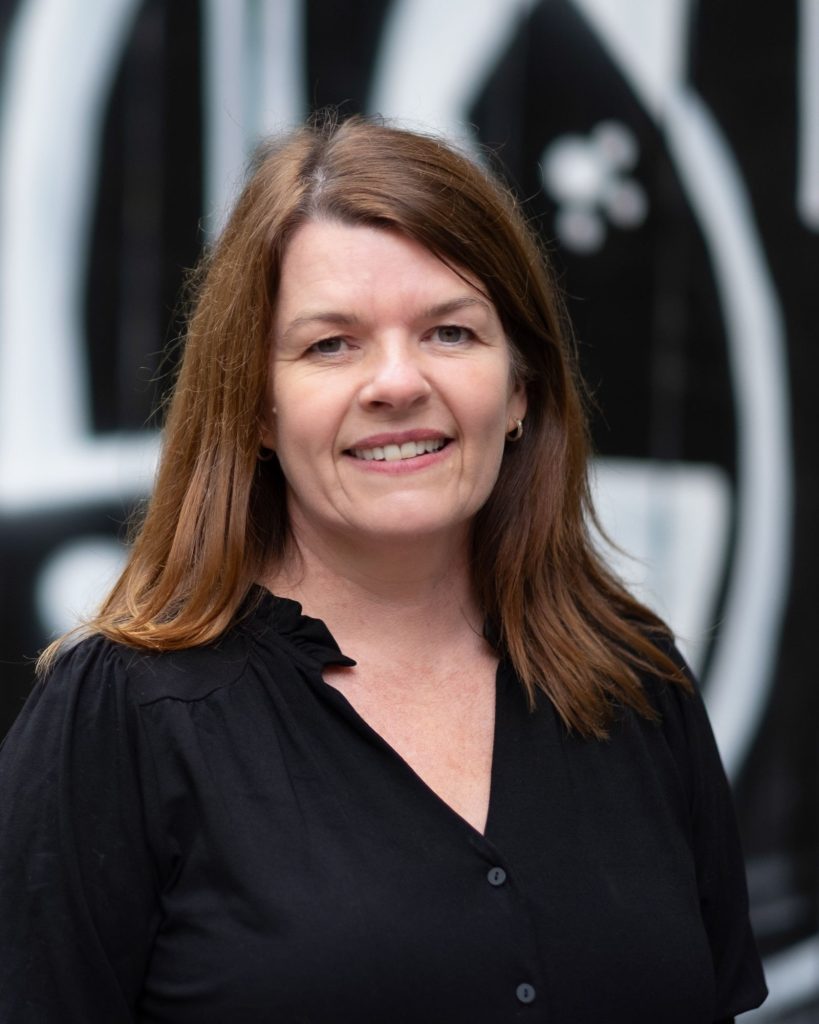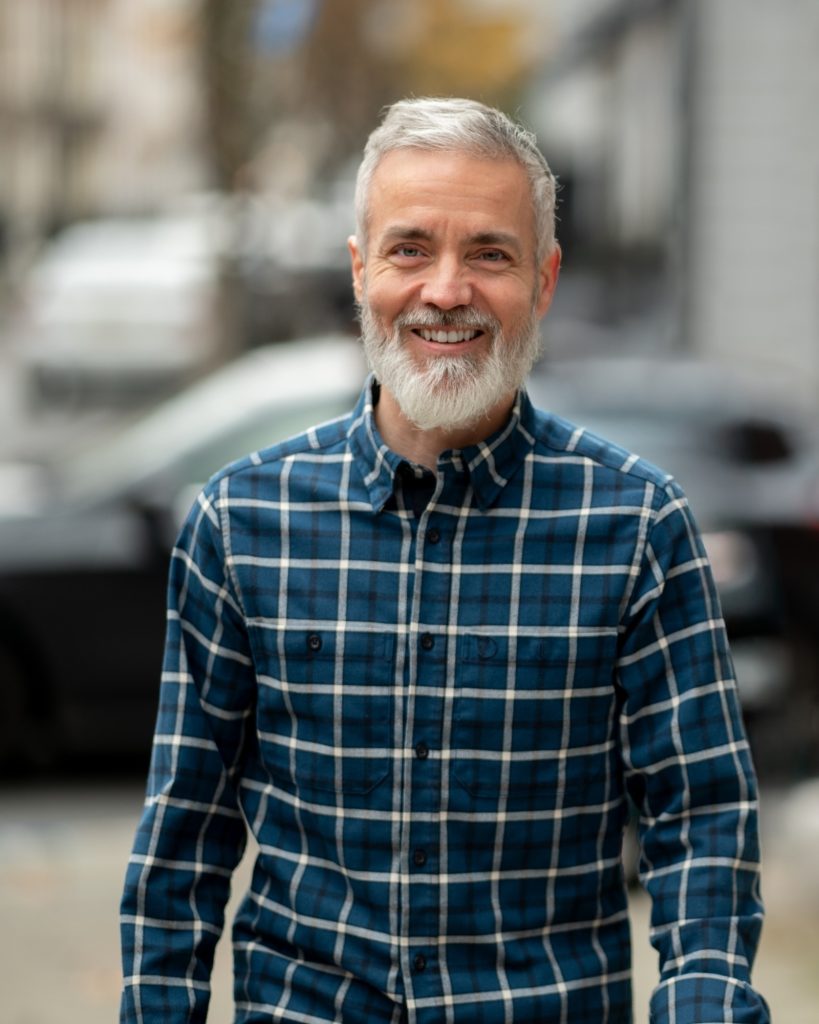by Charis Ainslie & Paul Russell Garrett
One began as a mentee, the other has mentored from the start. In this reflective exchange, Charis Ainslie and Paul Russell Garrett explore their paths into theatre translation, and how mentorship has shaped their practice along the way.
Charis Ainslie: Paul, as Head of Translation on the Foreign Affairs Theatre Translator Mentorship, you’re something of a guru when it comes to translating for the theatre. It’s such a niche area – how did you get into it?
Paul Russell Garrett: Ha, I’ve been called many things, but never a guru! I think most translators have an interesting origin story about their translation journey, but I think mine really was very unconventional. After careers in retail and catering, I started university as a mature student a little over 20 years ago and took a Scandinavian Studies degree. There was only one translation module (with a heavy focus on theory), and I had no notion of becoming a translator when I finished uni. What I did leave with was a passion for the Danish language and Danish literature and a broader interest in Scandinavian and Nordic literature. The theatre aspect happened kind of organically. I grew up in a working class suburb of Vancouver, and theatre was a complete unknown to me. When I discovered it as an adult, I found it stuffy, super traditional and not particularly engaging. But then, while I was in Denmark, I stumbled across a play by Benny Andersen called The Contract Killer, and immediately wanted to translate it. With no formal training or knowledge of how to go about it, I somehow felt confident that I could do it. That’s how I became a translator – I started with a rough draft, and then there was an informal reading with some actors my wife [Trine Garrett] was collaborating with through her newly-founded theatre company, Foreign Affairs. The play was eventually staged and published in the UK, and although I translate mainly literature now, I have managed to translate over a dozen plays. That early experience of translating a play without any formal training – guided solely by instinct, community and collaboration – laid the foundation for everything that has followed.
Charis: I love what you said just there – “instinct, community and collaboration”. That’s very much the world that was opened up to me when I found Foreign Affairs.
Paul: Ha, yes – I remember our first meeting, when you raced over to chat with us following a Translators Association workshop at Europe House. You were so excited – what was it that got to you?
Charis: I’d had this dream of translating for the theatre for years and years – and it was as if I’d been finally shown the way to achieve it. Foreign Affairs had just opened the call for their third Theatre Translator Mentorship programme. A colleague told me where to find a play (thank you, Charlie!) and I was incredibly lucky to find a play I fell in love with, and had a brilliant collaboration with the writer. I was very lucky in being selected for the Foreign Affairs programme. I don’t want to sound corny, but it really did change my life – not least because I’m now a mentor, which feels like a new stage of learning – I think you learn as much as a mentor as a mentee – would you agree?
Paul: Absolutely. It’s another form of collaboration, and, like working with actors to bring a piece to life, it’s a way of working that’s dynamic, responsive and highly creative. I’m also a workshop facilitator and language tutor, with all aspects of my approach grounded in practice rather than theory. I bring my lived experience to the mentorship – and to a large extent the mentorship is based on the experience I had when I was translating The Contract Killer. Everything is designed to get people thinking about how to bring their chosen play to life. Every participant brings something different to the table, and I learn something different from each one. How about you, what’s been your experience of mentoring?
Charis: I think you’re spot on there, we all bring something different to the table, and for me, it’s having been through the process and understanding what it feels like to be in that space. It’s quite a long programme – spread out over seven months – and there’s a lot of time and space to explore and experiment. But that can also be a bit alien – we often come to learning with an idea of what it should be like, and expecting to be given answers. This programme is different because although there’s obviously a structure, everybody’s exploration is different. We’ve had participants wondering how to approach a text that’s full of puns in the original language, or rich in proverbs that are unfamiliar to an English-speaking audience; or exploring a theme from their PhD thesis. My big question was whether to localise the play, setting it in the UK and changing the cultural references. The team gave me the time and space to explore a UK version, and for pretty much the whole mentorship I worked on two versions of the play, which came to be known as “the Garlic and the Gravy”. Ultimately, I went with the French version, but it felt really important to me to have gone really deep into both to really understand what was involved. Having that understanding means I can better support participants in their exploration and how they think about the mentorship. The best bit for me is seeing the connection between the translators and the plays they’ve chosen. For whatever reason, that play is special to them, and they gradually take ownership of that relationship. You’ve translated a lot of plays now – how do you approach translating for performance?
The best bit for me is seeing the connection between the translators and the plays they’ve chosen. For whatever reason, that play is special to them, and they gradually take ownership of that relationship.
Paul: I wouldn’t say I’ve translated a lot of plays but I have developed a few strategies along the way. A recent discovery was a chapter I read on translating voice by Peter Elbow, where he describes the play as being “written to be spoken as if not written”. So you’re transferring a written text into another written text, but it’s got to sound completely as if the characters are just speaking the words. I love translating dialogue and find it completely fascinating. I’ve just finished as Translator in Residence at BCLT where I explored what voice actually is, and I feel like I could spend my whole life delving into this subject. You want the characters and dialogue to sound authentic, so a lot of it’s about rhythm and word choice, even understanding how the vowels and consonants you choose can create different effects.
Charis: I know what you mean about wanting the dialogue to sound authentic. It’s not just about translating word for word – not that any translation is, but theatre is more extreme in that you have to find how the character would speak, not just what they’d say. I have a good example of this, actually! In the first play I translated, Where I Call Home by Marc-Antoine Cyr, the main character, Martin Martin, frequently says “Chépô” when his teacher asks him a question. It’s an invented contraction of “Je ne sais pas” (“I don’t know”) in French. But the way you say “Chépô” forces you to put your mouth in a certain position – it makes you feel sulky, slouchy, recalcitrant. From there, it’s a short leap to “Dunno”, and that unlocks a whole embodied way of thinking about how Martin Martin would express himself.
Paul: This also makes me think of when you say “cheese” for taking photos. In English, this makes your lips spread into a smile. If you said “ost”, the word for cheese in Danish, you have narrow rounded lips and the sound comes from the back of the mouth, so you just look really bored. So a certain effect in one language won’t work at all in another language!
Charis: Exactly!
Paul: What about the practical side – do you have a set way of approaching a new play?
Charis: In practical terms, I never start at the beginning. I always start with my second favourite part of the play. In terms of play structure, there are usually two main peaks – the climax, where everything kicks off, and the ending. I usually save whichever one I’m most excited about as a reward for finishing, and start with the other. At either point in the play, the characters are pretty clear and the dialogue is really exciting, so I find they’re great “entry points”. The start is often the hardest, so I tend to leave that part until I’m confident I’ve got the feel of how the characters speak. How about you? Do you have a set process?
Paul: Oh, that’s really interesting! I usually dive straight in with a rough first draft, then come back to it and finesse it, thinking just about the English language version. I’ll also be checking it against the original numerous times to make sure I haven’t strayed too far! But it always comes back to the same thing: collaboration. My introduction to the theatre world through Foreign Affairs brought me together with actors, directors, producers and other creatives, where I had the privilege of sharing a space with other practitioners. Then you’re no longer just a theatre translator, but also a theatre-maker.
My introduction to the theatre world through Foreign Affairs brought me together with actors, directors, producers and other creatives, where I had the privilege of sharing a space with other practitioners. Then you’re no longer just a theatre translator, but also a theatre-maker.
Charis: And has that informed the way you work?
Paul: Absolutely. I’ll bring the text to a group of actors and see how it sounds when read aloud. That might prompt discussions and changes to the text, and, if we’re working towards a production, that loop might be repeated multiple times until the text is watertight. That’s the process the mentees on the Theatre Translator Mentorship programme engage in. It’s a pretty unique experience, and really rewarding, to have the opportunity to hear your work read aloud and to see it embodied on stage. All the mentees become theatre-makers in their own right. Was that also your experience?
Charis: Very much so. I think the mentorship is amazing because it doesn’t just give translators the experience of translating a play and seeing part of it performed – it’s a very special invitation to become a theatre-maker and to enter that world, which can seem rather… I don’t want to say “closed” so I’ll just go for “impregnable”. My experience as a mentee gave me what I needed to go on and produce another play I’d translated. Without it, I wouldn’t have had a clue where to start. That introduction to theatre also made me realise just how hard it is to get work produced – for writers as well as translators. So I think being prepared to roll your sleeves up and be a maker, not just a translator, is key. I don’t know if it’s getting any easier, or if we’re just doing more for ourselves – what do you think?
Paul: I’m not sure I’d say it’s getting easier, but there are opportunities that didn’t exist when I started, and the number of people either translating for the theatre or interested in doing so is growing. So there are more opportunities now – for example, the BCLT and Bristol Translates summer schools have both included strands and talks on theatre translation in recent years. The Foreign Affairs mentorship has gone from strength to strength and now with its most recent edition (the sixth!), funded by the Jerwood Foundation, which has helped widen the scope of the programme. I think it has supported something like 23 translators and 23 plays. All this is showing the richness and variety of international theatre, and the more that goes on, the more will get programmed. As someone who’s done the mentorship and gone on to produce your own show, what advice do you have for someone who’s starting out?
Charis: The FA Theatre Translator mentorship is obviously the ultimate in terms of providing an end-to-end experience from translation to performance – and also in terms of providing the space and time for that exploration. That’s something that previous mentees have commented on. But there are also ways to get a taste of translating for the theatre – through summer schools, or through some of the shorter online or in-person events that Foreign Affairs are running. Just take a first step – find a play, translate an extract, attend a networking event – whatever you can do to bring you closer to that world. What about you? Any other advice?
Paul: I think finding some sort of community where you feel comfortable is the most important first step. A safe place where you can ask ANY question, like the Emerging Translators Network, when I started out. I also think about Charlie Gobbett’s experience with an amateur theatre company, or various writing programmes offered by theatres, where you can cut your teeth and test your translations. If they don’t mention being open to translators, write to them and ask why not! William Gregory has been a great champion of translators and opening up various awards and opportunities to translators, such as the Orange Tree Writers Collective.
But both the translation and theatre industry are really tough to break into, and when you combine the two, it can be really frustrating! One of my personal takes was to make sure people knew I was in this for the long haul, that this wasn’t a passing whim and that I would be there the next time someone needed a theatre translator, whether that was in 6 months or in 6 years. Of course you have to do other things to survive, but if you’re able to find something that ties into your love for theatre and translation, all the better!

Charis was a mentee on the 2018-19 Foreign Affairs Theatre Translator Mentorship programme, returning in 2020 as a mentor. Her first play in translation, Where I Call Home by Marc-Antoine Cyr, was produced by Foreign Affairs in 2021. She went on to produce This Last Piece of Sky by Kevin Keiss in 2022. She has been twice shortlisted for the ALTA Plays in Translation Contest. Originally a commercial translator, Charis has also translated a number of books for children and young people. She teaches on the MA Translation programme at the University of Surrey.

Paul is a literary translator from Danish and Norwegian, with drama holding a particular interest for him. Recent Foreign Affairs productions include Anna Bro’s The Warmhouse, Simone Isabel Nørgaard’s The Earth’s Core and Helmer Hardcore by Jakob Weis. He has translated a score of books, including Michael Strunge’s punk poetry collection Speed of Life, Christina Hesselholdt’s Vivian and Lars Mytting’s The Sixteen Trees of the Somme. Paul is chair of the association of Danish-English Literary Translators (DELT) and leads Foreign Affairs’ theatre translator mentorship.

